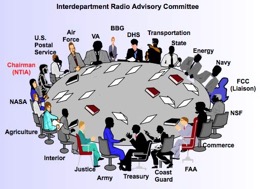White House Takes a More Active Spectrum Role

On 6/28/10 Lawrence H. Summers, Director of the White House's National Economic Council, spoke at the New America Foundation on the above topic and the President’s Spectrum Initiative - an odd recycling of a Bush 43 phrase that had no real impact.
Summers says the White House will push the necessary legislation to allow broadcasts to participate in “incentive auctions’ in which they could both profit and improve mobile service to the public, the vast majority of whom are not using spectrum for home connection to video.
NAB promptly replied,
"Expanding broadband is important, and broadcasters will work constructively with policymakers to help them attain that objective. We appreciate FCC assurances that further reclamation of broadcast television spectrum will be completely voluntary, and we're convinced that America can have both the finest broadband and broadcasting system in the world without jeopardizing the future of free and local TV service to tens of millions of viewers. We also believe the first priority of Congress ought to be passage of spectrum inventory legislation that identifies fallow spectrum or companies that may be 'warehousing' the airwaves."
Summers also said, “First, the government will examine how we are currently using spectrum and identify areas for improvement, consolidation, or sharing. To that end, we are pursuing a separate fast-track process to identify a down payment of specific bands of spectrum that could be freed up.”
In parallel with Summer’s talk, the White House released a Presidential Memorandum: Unleashing the Wireless Broadband Revolution. Here are some key sections:
(b) collaborate with the FCC to complete by October 1, 2010, a specific Plan and Timetable for identifying and making available 500 MHz of spectrum as described in subsection (a) of this section. For purposes of successfully implementing any repurposing of existing spectrum in accordance with subsection (a) of this section, the Plan and Timetable must take into account the need to ensure no loss of critical existing and planned Federal, State, local, and tribal government capabilities, the international implications, and the need for appropriate enforcement mechanisms and authorities;
(c) convene the Policy and Plans Steering Group (PPSG) to advise NTIA on achieving the objectives in subsections (a) and (b) of this section. The Secretaries of Defense, the Treasury, Transportation, State, the Interior, Agriculture, Energy, and Homeland Security, the Attorney General, the Administrators of the National Aeronautics and Space Administration (NASA) and the Federal Aviation Administration, the Director of National Intelligence, the Commandant of the United States Coast Guard, and the head of any other executive department or agency that is currently authorized to use spectrum shall participate and cooperate fully, or in the case of independent agencies are strongly encouraged to, in the activities of the Department of Commerce in accomplishing subsections (a) and (b) of this section and promptly provide appropriate funding and staff resources for agency support to these efforts and the work of the PPSG; and
(d) submit, not later than 180 days after the Plan and Timetable described in subsection (b) of this section are completed, to the National Economic Council (NEC), the Office of Management and Budget (OMB), and the Office of Science and Technology Policy (OSTP) an interim report to assess progress against the Plan and Timetable developed in accordance with subsection (b) of this section. Additional interim reports shall be submitted 180 days after the submission of the first interim report and then annually thereafter until such time as the Plan and Timetable are completed. In preparing these reports, the Secretary of Commerce shall work cooperatively with the FCC and other relevant departments, agencies, and offices.

I doubt if there will be any more meaningful sharing of federal spectrum unless the White House at least partially undoes the Nixon/Carter era reorganizations that moved the Section 305 power from the White House to the Commerce Department.



![Validate my RSS feed [Valid RSS]](valid-rss-rogers.png)

